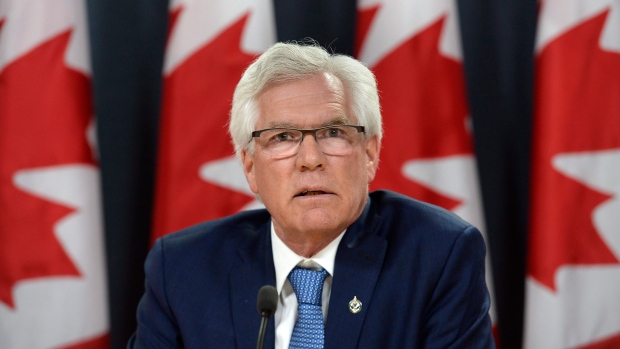May 15, 2017
Panel recommends dismantling National Energy Board to create two new agencies
, The Canadian Press

OTTAWA -- A panel advising the government on how to overhaul the National Energy Board says the regulator should be dismantled and replaced with two new agencies that would operate within a more coherent national energy policy.
After months of public hearings and talking to stakeholders, the panel says the National Energy Board has been given an impossible task: regulating the growth of the industry and marrying its growth with the government's economic and climate-change goals.
"Today the regulatory function is making de facto policy through its decisions," the panellists wrote in the 100-page report, presented Monday to Natural Resources Minister Jim Carr.
The panel recommends the government create a new national strategy that incorporates Ottawa's policy vision on energy, the environment, and the economy.
And it says before the energy regulator ever gets its hands on the file, the government should take up to a year to itself consider whether any new projects of national consequence align with that vision, including significant and meaningful consultation with indigenous communities.
That can include looking at economic benefits to the country, indigenous rights and a climate test for emissions both upstream and downstream of the proposed project.
Once cabinet approves a project, it would proceed to a technical and environmental review done by a new Canadian Energy Transmission Commission, in conjunction with the Canadian Environmental Assessment Agency. Together they would have full authority to grant licenses to projects, without going back to cabinet for final approval.
The panel recommends that smaller-scale projects not considered to be of national significance skip the cabinet review and go straight to the joint technical and environmental assessment.
Together, the Canadian Energy Transmission Commission and the Canadian Environmental Assessment Agency would have up to two years to review and make a decision, bringing to three years the review period for any new pipelines or electrical grids that cross provincial or international borders.
Under legislation passed in 2012 by the former Conservative government, the current board has to release a decision on new projects within 15 months; cabinet then has three months to decide whether it agrees with that recommendation.
That time frame is "unrealistic for large, complex projects," said the panel.
"Too much is expected within too ambitious a time frame, forcing either rushed decisions and limited public engagement, or timeline extensions that reduce predictability for project proponents."
However Alberta PC Leader Jason Kenney, a prominent member of the former Conservative government that introduced the tighter timelines, called the idea of extending the timeline "absurd."
"Only the ideological opponents of resource development think pipeline permitting should go slower," Kenney wrote on Twitter.
The commission would replace the National Energy Board, but without the function to produce and analyze energy industry data. That role would go to a new Canadian Energy Information Agency, to ensure the production and analysis of information is completely separate from the use of that information to assess project proposals.
The panel said there was a pervasive feeling among many they heard from that the National Energy Board is too connected to the energy industry -- a perception fuelled in large part by the fact it creates the very information and analysis on which it bases its decisions.
The panel further recommends the new information agency be moved to Ottawa so it can be closer to staff in other departments such as Statistics Canada and Natural Resources.
While it stopped short of recommending the Calgary-based NEB be moved entirely to Ottawa, it says more and more of its function should be -- particularly as electricity transmission overtakes fossil fuels as its prime topic.
The board for the new agency should be based out of a new Ottawa office, the panel recommended, but board members would be allowed to live anywhere. Currently they have to live in Calgary.
"We do agree entirely that Canada's energy transmission infrastructure regulator needs a stronger connection to the seat of the federal government," the panel said.
The government is accepting comments online on the panel recommendations until June 14.
The National Energy Board has a mandate to regulate the construction and operation of fossil fuel pipelines and power lines that cross provincial or international borders, as well as the imports and exports of natural gas, the export of oil and electricity and oil and gas exploration.
It is an arm's-length, quasi-judicial tribunal that reports to Parliament via the natural resources minister.





